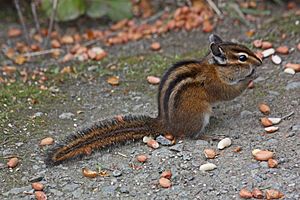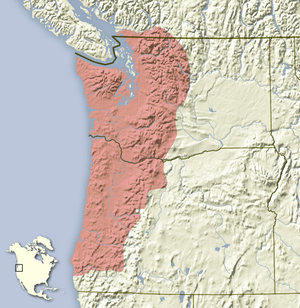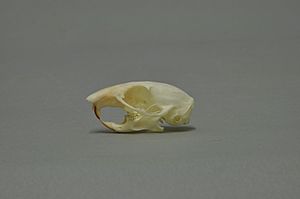Townsend's chipmunk facts for kids
Quick facts for kids Townsend's chipmunk |
|
|---|---|
 |
|
| Conservation status | |
| Scientific classification |
|
| Kingdom: | Animalia |
| Phylum: | Chordata |
| Class: | Mammalia |
| Order: | Rodentia |
| Family: | Sciuridae |
| Genus: | Neotamias |
| Species: |
N. townsendii
|
| Binomial name | |
| Neotamias townsendii (Bachman, 1839)
|
|
 |
|
| Script error: The function "autoWithCaption" does not exist. | |
| Synonyms | |
|
Tamias townsendii Bachman, 1839 |
|
Script error: No such module "Check for conflicting parameters".
The Townsend's chipmunk (Neotamias townsendii) is a small, busy animal. It is a type of rodent in the squirrel family. These chipmunks live in the forests of the Pacific Northwest region of North America. You can find them from southwestern British Columbia in Canada, all the way through western Washington and western Oregon in the United States. This chipmunk is named after John Kirk Townsend, who was a scientist in the early 1800s.
Contents
What Does a Townsend's Chipmunk Look Like?
Townsend's chipmunks are quite large for a chipmunk. An adult can grow to be about 36 centimeters (14 inches) long from its nose to the tip of its tail. In many places where it lives, it's the only type of chipmunk you'll see.
You can tell it apart by a few things:
- Its tail is grayish on top and reddish underneath.
- Its fur is mostly brown.
- It has stripes, but they are not very clear or bright.
How Do Townsend's Chipmunks Live?
Townsend's chipmunks are very active creatures. They are omnivores, which means they eat both plants and animals. Their diet includes many different kinds of plants, insects, and even bird eggs!
Staying Active All Year
In places with very cold winters, Townsend's chipmunks will hibernate. This means they go into a deep sleep to save energy. But in areas where the weather is milder, they can stay active all year long.
What Do They Eat?
These chipmunks love to eat berries in the summer and early fall. Some of their favorites are blackberries, salal berries, and thimbleberries. As fall turns into winter, their diet changes. They start eating things like:
- Acorns
- Huckleberries
- Maple seeds
- Thistle seeds
- Grain seeds
- Grass
- Roots
- Seeds from pine trees and other conifers
In the Oregon Coast Range, you'll find more Townsend's chipmunks where there are lots of dense bushes. They especially like areas with a plant called salal.
 | Chris Smalls |
 | Fred Hampton |
 | Ralph Abernathy |



